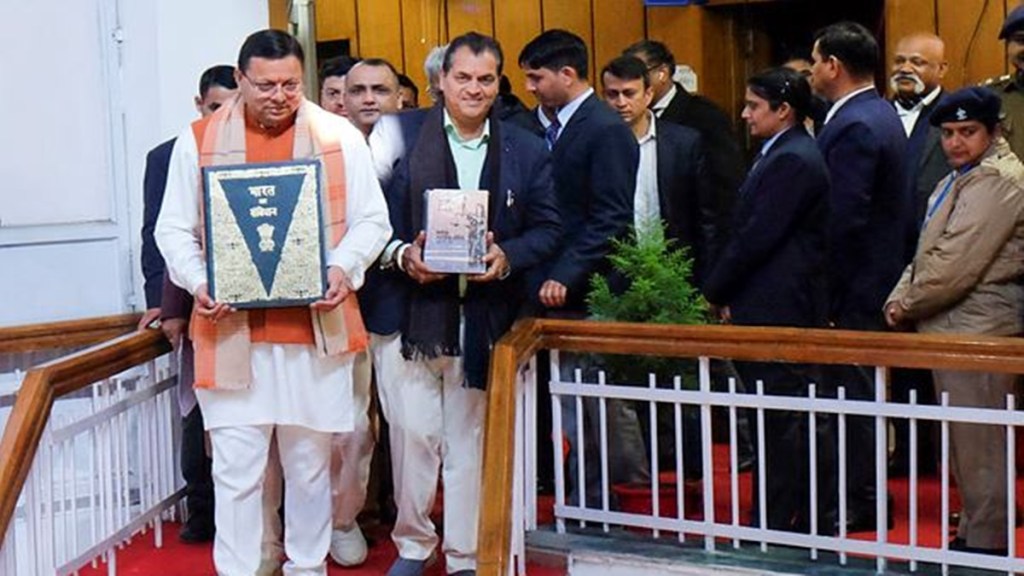Jail term up to six months for not registering live-in relationships, special rights for women to seek divorce, hefty fines for non-registration of marriage are some of the key features in the proposed Uniform Civil Code (UCC) bill that was tabled in the Uttarakhand Assembly on Tuesday by Chief Minister Pushkar Singh Dhami.
An expert panel had earlier made recommendations for the Bill, a key poll plank of the BJP. It proposes a uniform set of laws governing personal matters like marriage, divorce, inheritance, and adoption for all citizens, irrespective of their religion.
If passed, Uttarakhand will be the first state after independence to have a Uniform Civil Code. Goa has a similar civil code that was implemented during the Portuguese colonial era.
Also Read: Uniform Civil Code Bill to be tabled in Uttarakhand Assembly today
Rules for live-in relationships
Individuals in, or planning to enter, live-in relationships in Uttarakhand must register themselves with district officials once the Uniform Civil Code becomes law, with parental consent required for those below the age of 21 who wish to live together. Mandatory registration of such relationships extends to individuals who “any resident of Uttarakhand… in a live-in relationship outside the State”.
Live-in relationships will not be registered in cases that are “against public policy and morality”, if one partner is married or in another relationship, if one partner is a minor, and if consent of one partner was obtained by “coercion, fraud, or misrepresentation (with regard to identity)”. Partners may terminate their live-in relationship by submitting statements to the Registrar.
Children of a couple in live-in relationship will be considered legitimate. Women deserted in a live-in relationship are entitled to claim maintenance and may approach court.
Failure to submit live-in relationship declarations, or providing false information, could land one in jail for three months, a fine of Rs 25,000, or both. Anyone who fails to register a live-in relationship will face a maximum of six months in jail, be fined Rs 25,000, or both. Even a delay in registration, by as little as a month, will trigger a jail term of up to three months, a fine of Rs 10,000, or both.
Also Read: Uniform Civil Code: Uttarakhand Assembly session begins today, UCC Bill to be tabled on Feb 6
Rules for divorce
Both men and women can approach a court to file for divorce on grounds of adultery, mental or physical cruelty by spouse, desertion without any reasonable cause, religious conversion by the spouse, unsoundness of mind, venereal diseases etc.
Women have special rights to seek divorce if the husband has been found guilty of rape or any other offence related to unnatural sex and if the husband has more than one wife.
A couple cannot approach the court for divorce in less than one year of their marriage, except in exceptional cases.
Rules for marriage
Registration for marriage will be made compulsory. The registration will have to be done in 60 days after the marriage.
All marriages after March 26, 2010, will have to be registered within six months.
Non-registration of marriage will entail a maximum fine of Rs 20,000. However, not registering a marriage will not make it invalid.
The man must have completed the age of 21 years and the woman 18 years.
At the time of the marriage, neither party should be incapable of giving valid consent in consequence of unsoundness of mind. Even if they are capable of giving valid consent, neither party should be suffering from a mental disorder of such a kind so as to be unfit for marriage.
Marriages may be solemnised in accordance with the religious beliefs, practices, customary rites and ceremonies, including, but not limited to Saptapadi, Ashirvad Nikah, Holy Union, Anand Karaj under The Anand Marriage Act 1909 as well as under, but not limited to, The Special Marriage Act 1954 and Arya Marriage Validation Act, 1937.
Provisions of the UCC Bill do not apply to tribal communities
Currently, personal laws in India are complex, with each religion following its specific regulations. The idea of the UCC is to create a set of uniform laws applicable to all the communities in India when it comes to personal laws on marriage, inheritance, divorce, etc.
However, this Bill’s provisions will not apply to tribal communities. The Bill says, “Nothing contained in this code shall apply to the members of any Scheduled Tribes within the meaning of clause (25) of Article 366 read with Article 142 of the Constitution of India and the persons and group of persons whose customary rights are protected under Part XXI of the Constitution of India.”
Given the unique customary practices of tribal communities, many have criticised the idea of the UCC over the years.
Bill prohibits bigamy or marriages with more than one person
Under Section 4, the Bill lists five conditions for marriage. It says a marriage may be solemnised or contracted between a man or a woman if those conditions are fulfilled. The first condition is: “neither party has a spouse living at the time of the marriage”, thus prohibiting bigamy or polygamy.
(With inputs from PTI)


